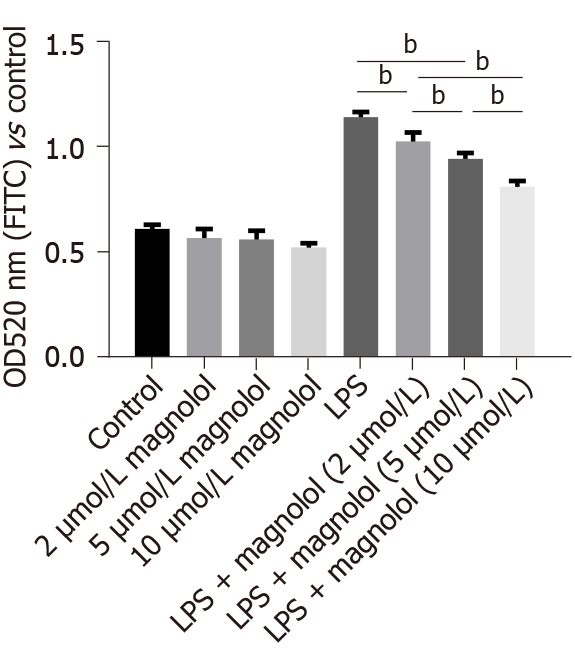Copyright
©The Author(s) 2021.
World J Clin Cases. Dec 6, 2021; 9(34): 10451-10463
Published online Dec 6, 2021. doi: 10.12998/wjcc.v9.i34.10451
Published online Dec 6, 2021. doi: 10.12998/wjcc.v9.i34.10451
Figure 2 Effects of different concentrations of magnolol on Caco2 cell permeability induced by lipopolysaccharide.
Cell permeability was evaluated to determine the concentration of magnolol that inhibited the lipopolysaccharide (LPS)-induced increased permeability of Caco2 cells. After adding LPS, the permeability of the cells was significantly increased (bP < 0.01). After adding magnolol to LPS-treated Caco2 cells, the permeability of the cells was decreased in a dose-dependent manner (bP < 0.01). Control: Treated with solvent only; 2 μmol/L, 5 μmol/L, and 10 μmol/L magnolol: Treated with different concentrations of magnolol; LPS: Treated with solvent and LPS (100 μg/mL); LPS + magnolol (2 μmol/L, 5 μmol/L, and 10 μmol/L): Treated with magnolol (2 μmol/L, 5 μmol/L, and 10 μmol/L) and LPS (100 μg/mL); OD520nm: Optical density at 520 nm; FITC: Fluorescein isothiocyanate isomer. LPS: Lipopolysaccharide.
- Citation: Mao SH, Feng DD, Wang X, Zhi YH, Lei S, Xing X, Jiang RL, Wu JN. Magnolol protects against acute gastrointestinal injury in sepsis by down-regulating regulated on activation, normal T-cell expressed and secreted. World J Clin Cases 2021; 9(34): 10451-10463
- URL: https://www.wjgnet.com/2307-8960/full/v9/i34/10451.htm
- DOI: https://dx.doi.org/10.12998/wjcc.v9.i34.10451









